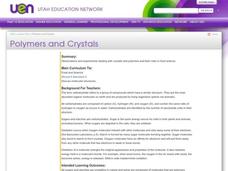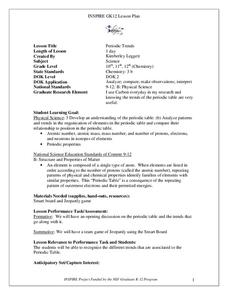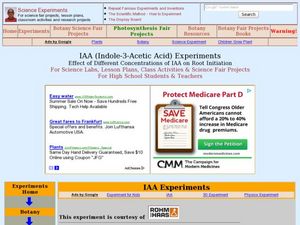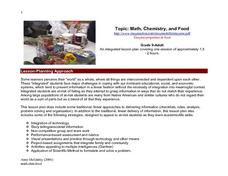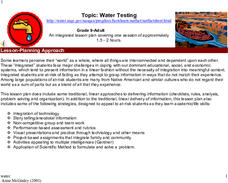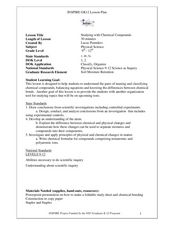Consortium for Ocean Science Exploration and Engagement (COSEE)
Ocean Acidification: Whats and Hows
Open this activity by demonstrating the production of acidic carbon dioxide gas by activated yeast. Emerging ecologists then experiment with seashells to discover the effect of ocean acidification on shelled marine organisms. They...
Curated OER
Water and Polymers
Students conduct qualitative and quantitative investigations based on the interaction between water and various polymers. They determine the percent moisture contained in various plastics along with a qualitative procedure to determine...
Curated OER
Polymers and Crystals: Their Role in Food Science
Blend chemistry with cooking in this exploration of polymers, carbohydrates, and food science. Experimenting with gelatin produces concrete examples of the bonding and ploymerization discussed in the lesson. Copious, comprehensive...
Curated OER
Element Research Project
Students research elements on interactive Internet periodic tables, take notes using Inspiration software, and write descriptive paragraphs with graphics. They create presentations.
Curated OER
The Periodic Table
These slides introduce the basics of the Periodic Table structure and the history and reasoning behind its organization. A useful chart on the fifth page gives the main properties and differences between metals, non-metals and...
Curated OER
Sunrise/Sunset
Third graders discovver what causes the dramatic colors of a sunset by seeing the changing color of light as it passes through a clear container of water to which milk is gradually added. They measure the liquids and observe what happens...
Virginia Department of Education
Elements and Electron Configuration
It's electronic! Pupils uncover elements and their electron configurations as they explore mass, groupings, correct charges, and sliding theory. Young scientists learn creative ways to remember various elements and correctly classify...
Curated OER
Chemosynthesis in the Classroom
Students observe the development of chemosynthesis in bacterial communities. In this bacteria lesson students explore that chemosynthesis is and how it is relevant to biological communities.
Curated OER
Alkanes and Conformation
In this alkanes and conformation worksheet, students name 10 different alkanes, they write the structural formulas for 4 alkanes, and they write Newman projections for 2-methylbutane. They also write structure of stable conformations for...
Curated OER
Math, Chemistry, and Food
Young scholars explore the effects of chemical reactions when cooking. Using the Internet, they research enzymes and then mix jello. They examine their results and test enzyme activity by adding pineapple to the jello. Finally, they...
Curated OER
Periodic Trends
Students identify the different periodic trends. In this chemistry lesson, students discuss how elements are arranged in the periodic table. They apply what they have learned in a Jeopardy team game.
Curated OER
Periodic Table Patterns using Fabulous Periodic
Students explain how elements are arranged in the periodic table. In this chemistry lesson, students group the eggs according to a certain pattern. They compare this to elements in the periodic table.
Curated OER
Calculating the Average Mass of the Newly Discovered Element: Bean
Students determine the average mass of a new element using masses from three isotopes. In this chemistry instructional activity, students explain what an isotope is. They discuss their importance and uses.
Curated OER
Code Makers - Electron Configuration, Aufbau Principle
Learners write the electron configuration of elements using the Aufbau principle. In this chemistry lesson, students build their own key that demonstrates the principle.
Curated OER
Ions in the Environment
Students explain the importance of the five main biogeochemical cycles. In this chemistry lesson plan, students discuss how ions are transported in the environment. They design an experiment to collect data on eutrophication.
NOAA
Off Base
How does carbon dioxide affect the world's oceans? The final installment in a series of six lessons has pupils research ocean acidification, then conduct an experiment to witness the delicate balance that exists in our seas. Materials...
Curated OER
Auxin: Indole-3-Acetic Acid (AAA), A Hormone with Diverse Effects: Synthesis and Applications
Learners synthesize Indole-3-Acetic acid from 3-indolylacetonitrile. In this biochemistry lesson, students determine the effect of different concentrations of IAA on lima beans. They explain how hormones help in plant development.
Curated OER
Modeling Atoms
High schoolers create an atomic model using a computer program. For this technology lesson, students identify the difference between radius and diameter. They create circular patterns and spheres based on certain specifications.
Curated OER
Teaching about the Chemistry of Oxygen Solubility
Students explore solubility of gases in water, Henry's Law, LeChatelier's Principal, and supersaturation of gases in water.
Curated OER
Topic: Math, Chemistry, and Food
Students listen as the teacher tells the story of Sisyphus rolling the stone up the mountain. Students prepare two batches of jello, one with fresh pineapple, and one with canned pineapple. While the jello is setting, students work on...
Curated OER
Root, Root, Root for the Nutrients
Students observe the growth of a seed, predict what will happen when seeds are planted without soil, and conduct an experiment using a hydroponics system.
Curated OER
Ecology: Symbiosis
Eighth graders identify various types of symbiotic relationships. In this ecology lesson, 8th graders predict whether certain organisms can form symbiosis with other organisms. They discuss and defend their reasoning.
Curated OER
Water Testing
Students work together to design their own experiment to test developed hypothesis about the minerals in water. As a class, they discuss the main components of water quality and describe the chemistry behind the hardness assay. They...
Curated OER
Studying with Chemical Compounds
Students create a foldable to help them remember topics on chemical compounds. In this physical science lesson plan, students differentiate ionic and covalent compounds. Given certain compounds, they identify whether it's ionic or covalent.




